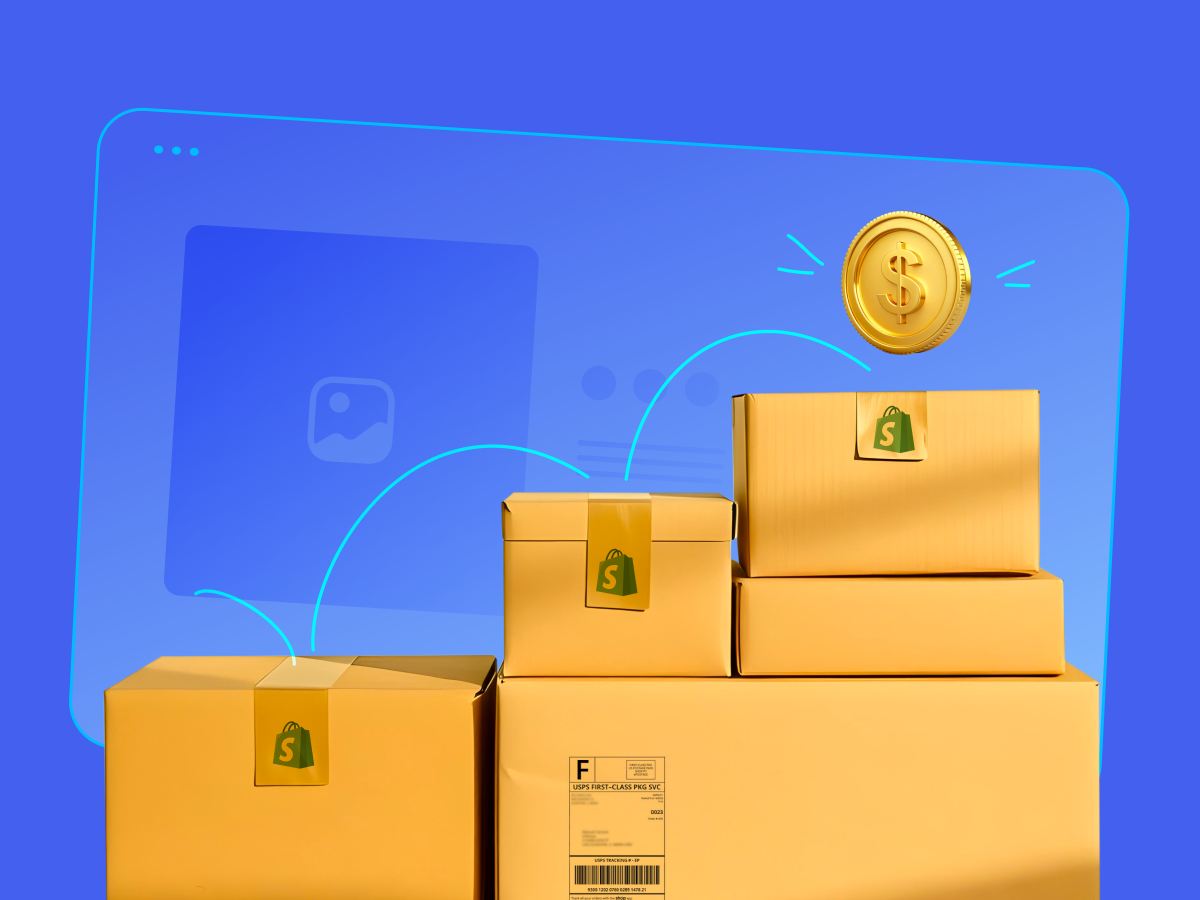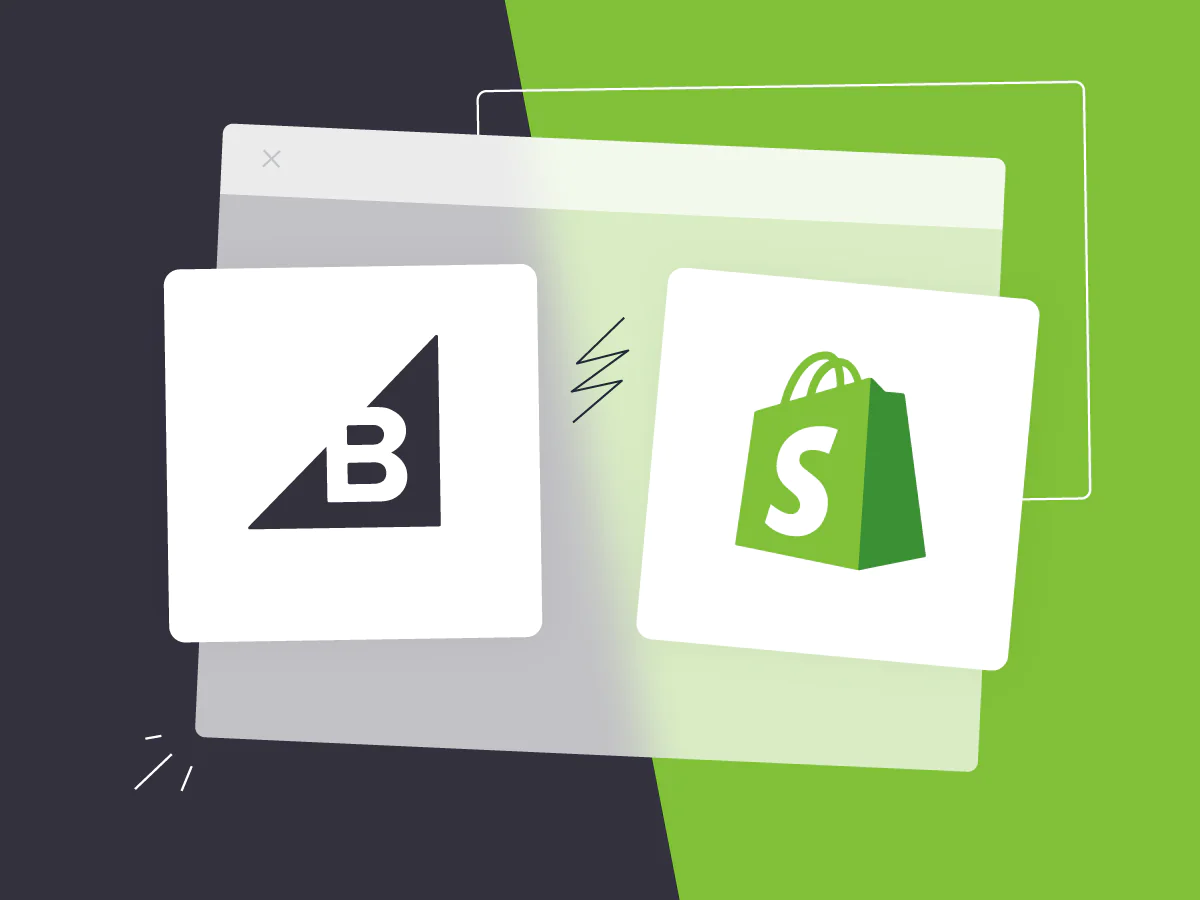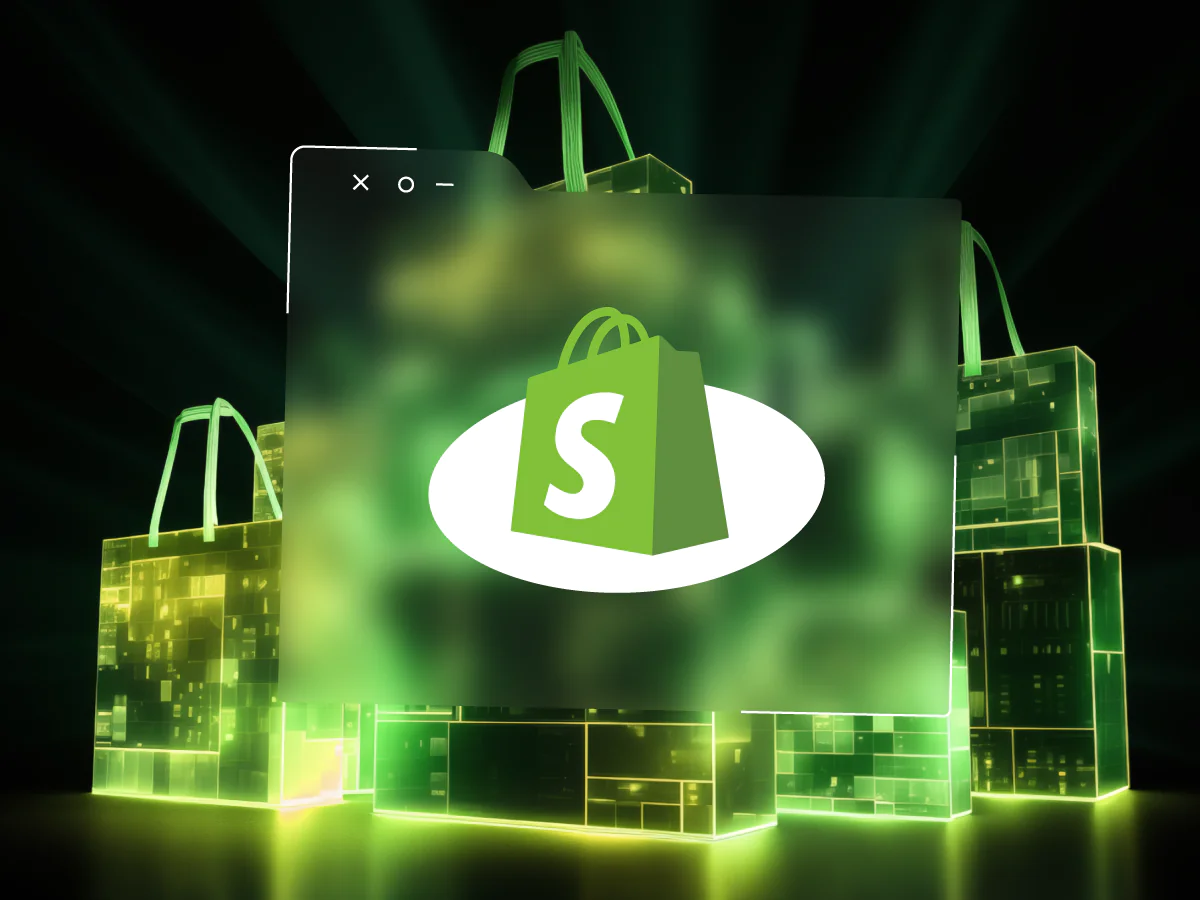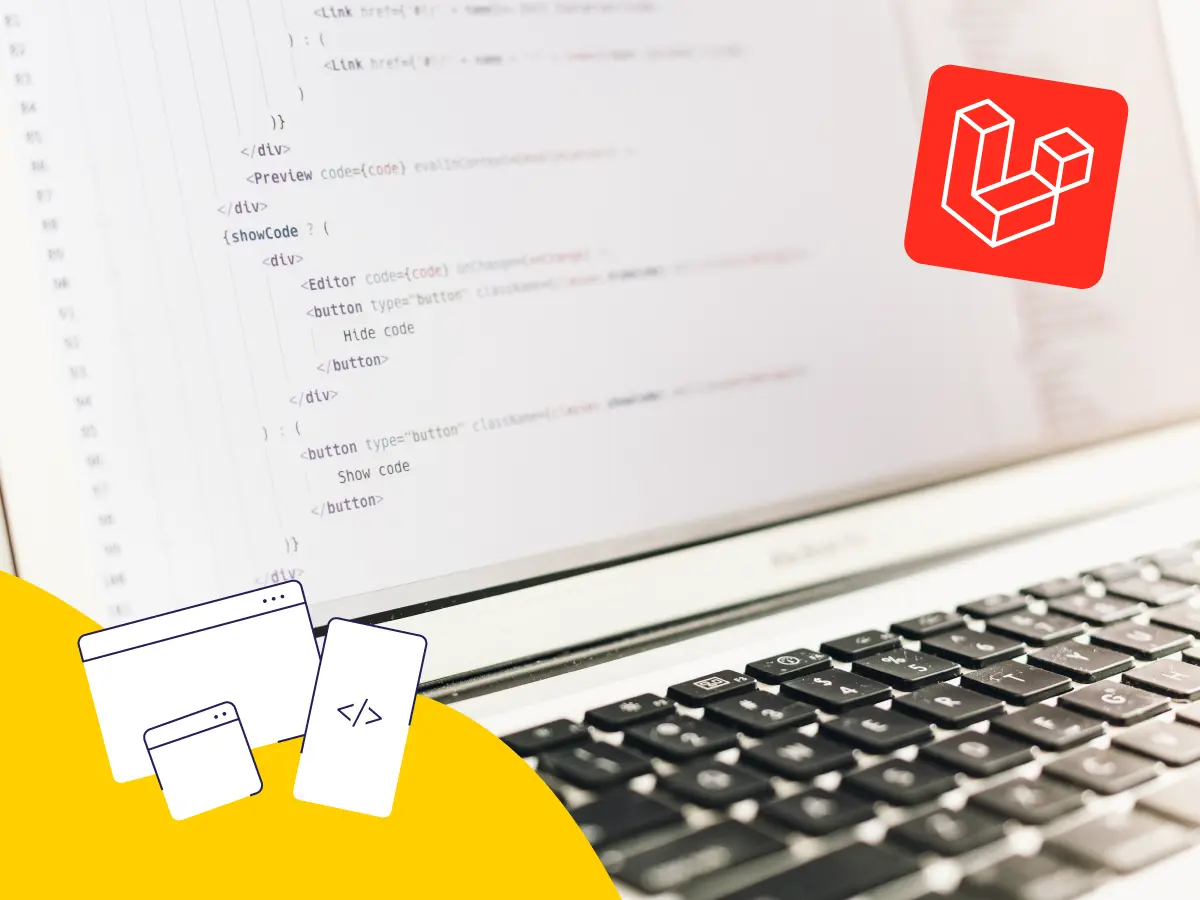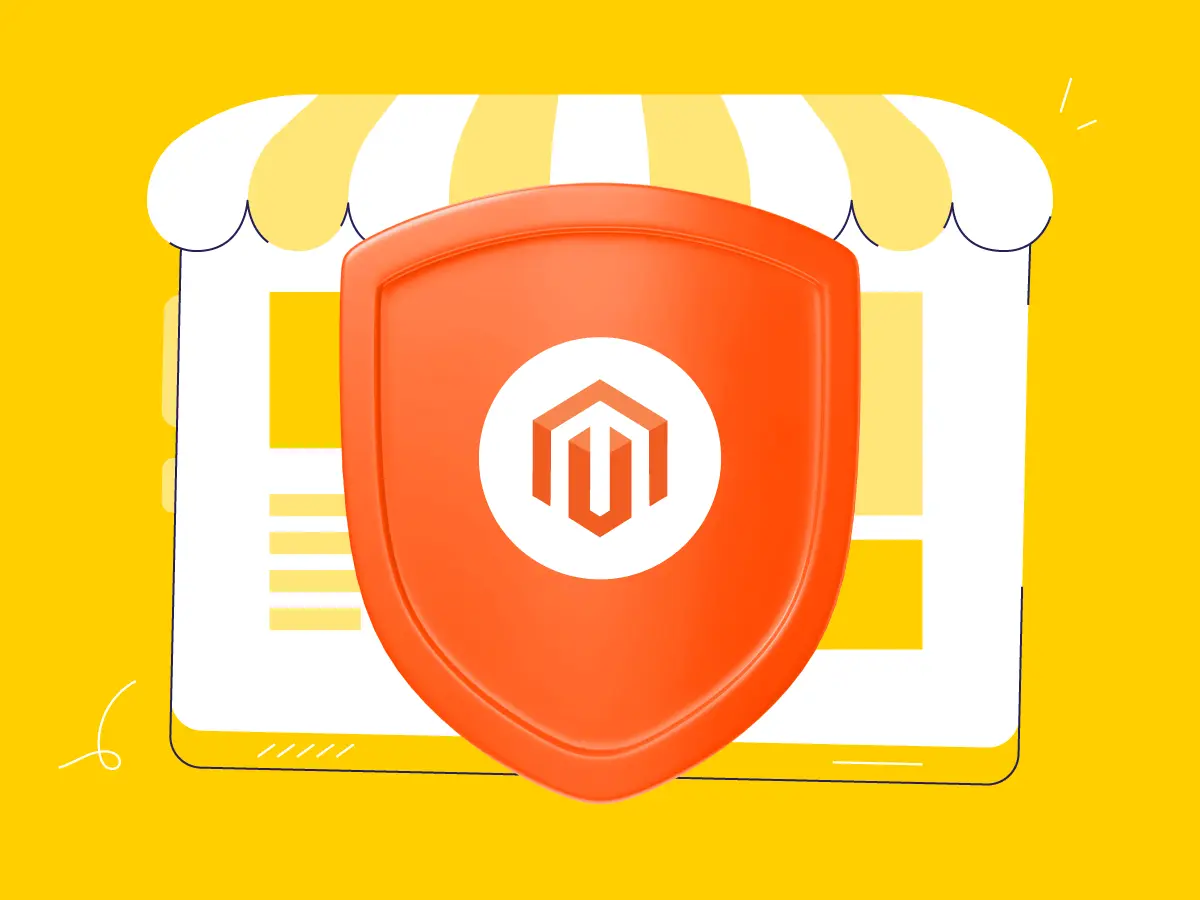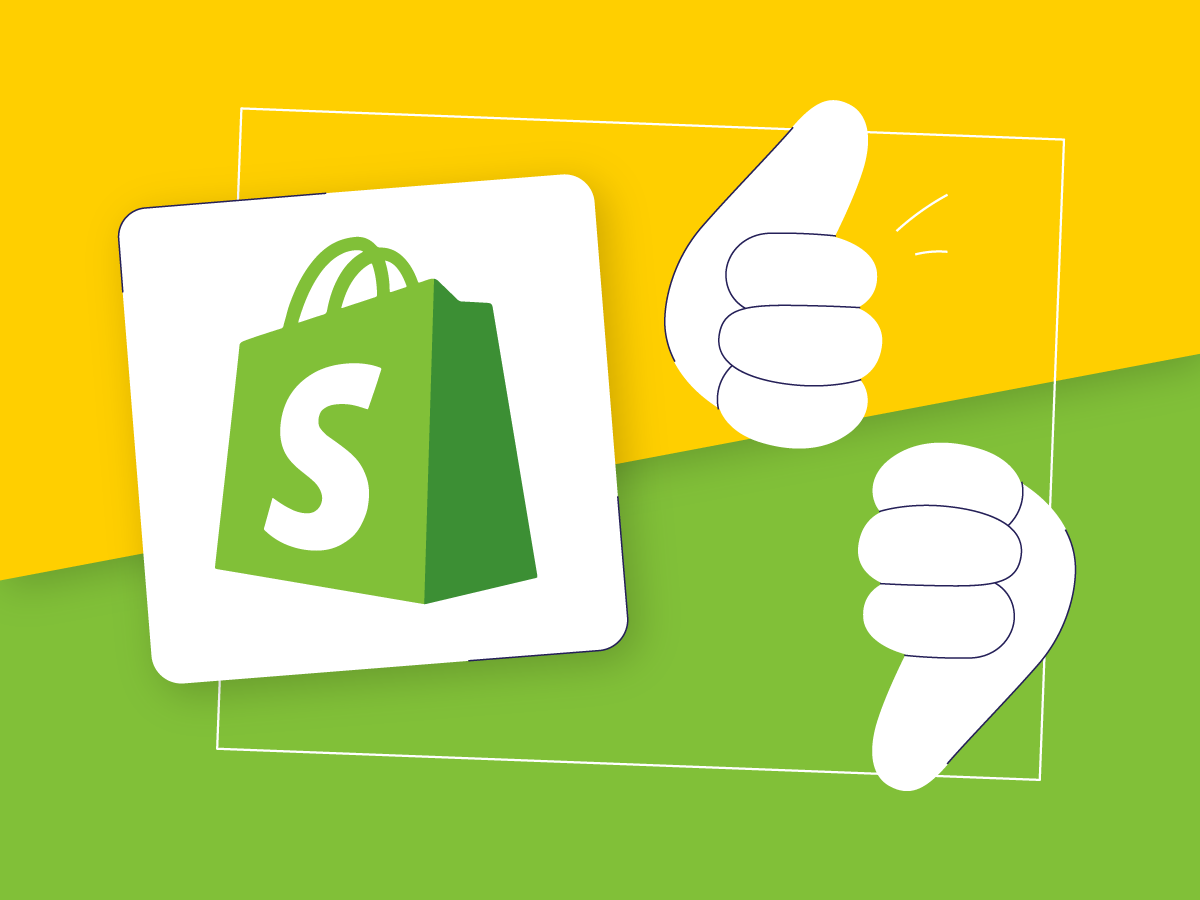Nasdaq predicts that by 2040, nearly 95% of all purchases will be made online. Thus, setting up a store on the web is a must to stay competitive. The easiest way to do this is to opt for a specialized eCommerce platform like BigCommerce and Shopify.
They enable anyone to set up, promote, and expand a lucrative online business from a single site. Hosting countless online shops, these platforms facilitate commerce, generating billions in sales. Both are designed to be user-friendly. They both are equipped with straightforward features and adaptable, mobile-optimized templates.
However, each platform has its unique pros and cons, depending on what you want to achieve. Want to see how they compare? Let’s dive into a side-by-side look at Shopify vs. BigCommerce to help you figure out which suits your needs best.
Shopify vs. BigCommerce: Basic overview
Let’s compare two leading eCommerce platforms to help you decide whether BigCommerce or Shopify is right for your business. Each of them has unique features suited for different users. We’ll consider both pros and cons of Shopify and BigCommerce for your online store. Here’s a basic overview of what each offers:
Shopify
Shopify is a user-friendly eCommerce platform. It’s great for both beginners and experienced merchants. Users can easily create and manage their online stores using customizable templates and a wide array of plugins.
Key features:
- Simple setup and easy management.
- Many themes and customization options.
- Large app marketplace for extra features.
- Integrated payment processor, Shopify Payments.
- Round-the-clock customer support.
With over 4 million live stores, Shopify is ideal for anyone looking for an easy-to-use platform that scales well and offers strong support.
BigCommerce
BigCommerce caters to a wide array of businesses, from small startups to large enterprises. It offers comprehensive features right out of the box. Thus, you may not need any additional plugins. The platform is excellent for managing large product inventories. It’s also suitable for selling across multiple channels like Facebook and Amazon.
Key features:
- Advanced product management.
- Rich built-in features.
- Supports selling on multiple channels.
- Detailed analytics and SEO tools.
- Robust customization capabilities.
With around 40 thousand live stores, it’s a great option for businesses needing a complete solution from the start.
Design and customization
Forrester Research finds that a clear and user-friendly UX design can increase conversion rates by 200%, and in some cases, it can even soar to 400%. Thus, having a well-designed interface is critical for your sales.
With Shopify, aesthetics are never a problem. It offers a wide range of free and premium themes that are both modern and responsive. In this way, Shopify caters to businesses that prioritize design and brand identity. Moreover, customization is simple with Shopify’s theme editor and extensive app store. It allows you to tailor your site to your specific needs easily.
BigCommerce also offers a variety of themes and customization options. However, tweaking these designs might require a little more technical knowledge.
Theme variety and quality
Shopify offers a vast selection of trendy, responsive themes suitable for various industries. The themes are professionally designed and come in both free and premium options. So, you can find one for your budget. They are created following the best UX practices and facilitate sales growth.
BigCommerce provides a range of themes but in a smaller collection. These themes often require more customization to match Shopify’s ready-to-use aesthetics. Adapting themes could demand more technical skills.
Customization capabilities
Both Shopify and BigCommerce offer drag-and-drop editors that simplify the website-building process.
Shopify features an intuitive theme editor that simplifies customization through drag-and-drop tools. For deeper customization, Shopify supports modifications via HTML, CSS, and its own templating language, Liquid.
Shopify enhances this experience with its “sections” feature. It allows users to easily modify, display, hide, and organize store elements. This user-friendly setup is ideal if you have no design or coding background. You can adjust the sections to craft the perfect online shopping journey for your customers as shown in the .gif below.
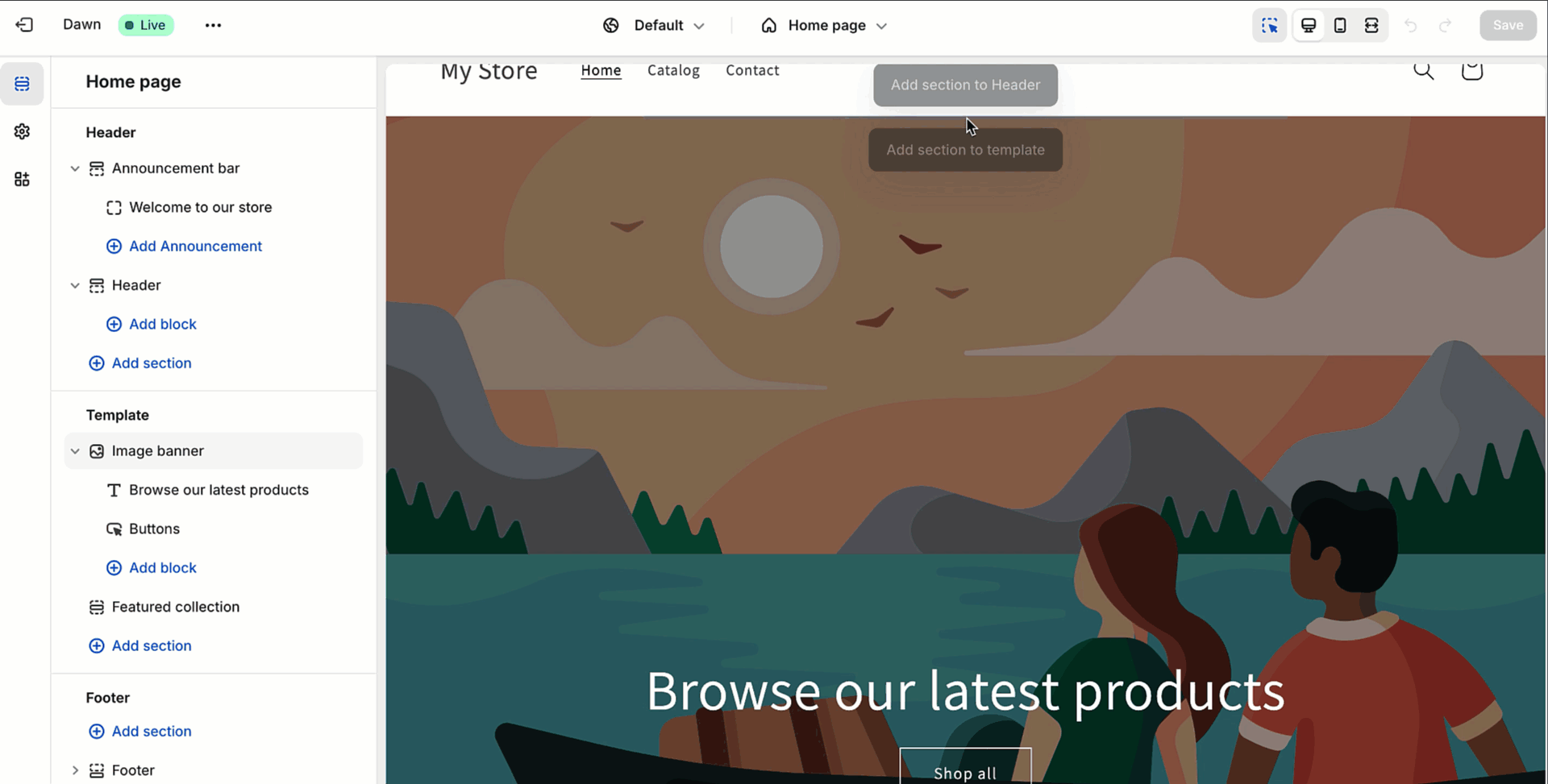
BigCommerce allows robust customization but typically needs more technical knowledge. So, it’s less ideal for those without web development experience. However, its basic drag-ad-drop builder is quite similar to Shopify’s, but it’s less flexible.
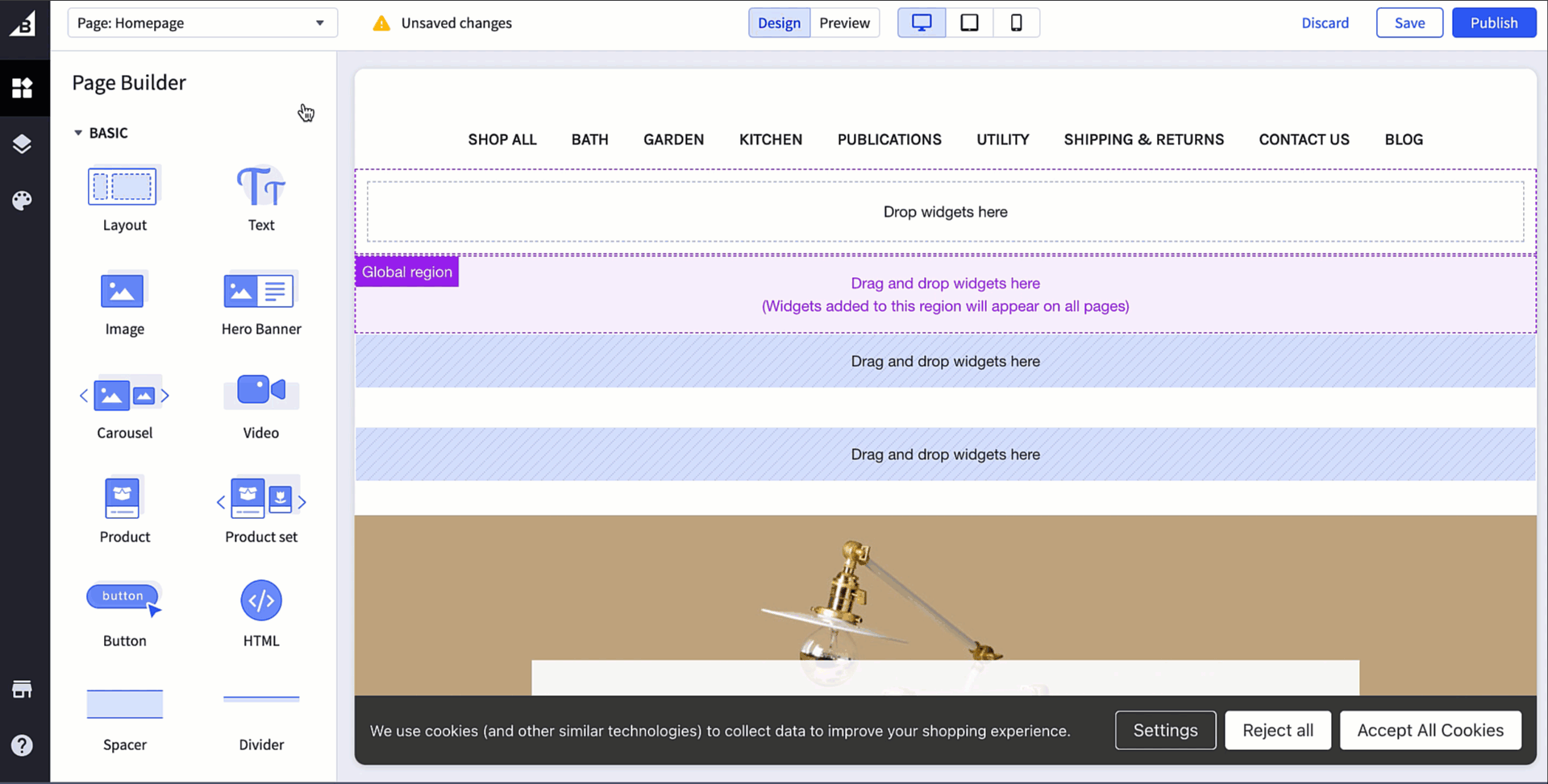
Features and functionality
Shopify is great for adding new features to your store through its wide range of apps. Need better SEO tools, marketing help, or a way to manage your inventory? There’s likely an app for that. Shopify also works with many payment gateways, giving you lots of options for handling sales.
BigCommerce comes with many powerful features already included. You might not need as many third-party apps as you would with Shopify. It offers advanced SEO tools, ready-to-use shipping solutions, and great options for wholesale businesses.
E-commerce tools and capabilities
Shopify has a variety of features that suit both beginners and experienced business owners. It includes powerful SEO tools, simple checkout processes, and built-in shipping options. Shopify also offers its payment system, Shopify Payments. It makes transactions smoother and doesn’t add extra fees.
Additionally, Shopify offers a convenient sales analytics dashboard to enhance your store’s conversions and business improvement.
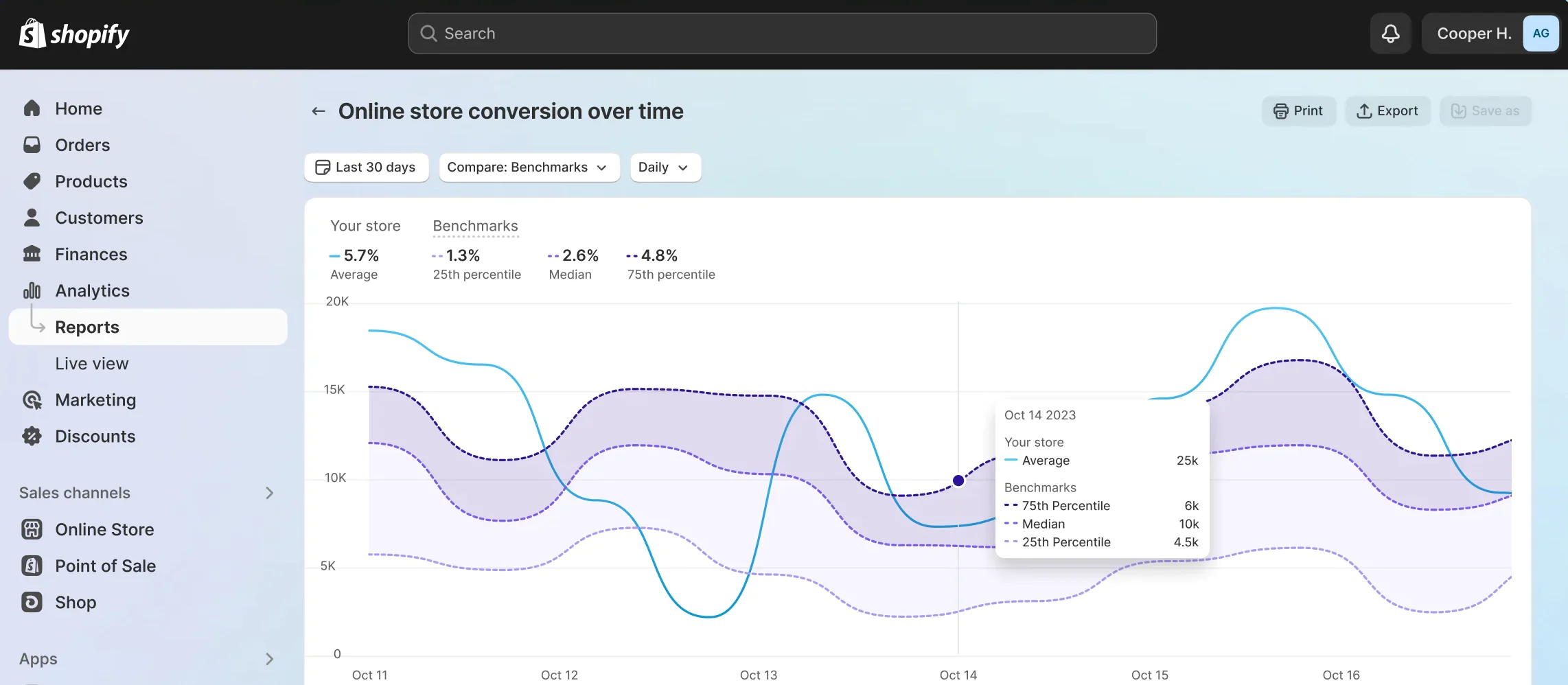
BigCommerce also provides a full set of e-commerce tools. It comes with advanced SEO options, and different shipping methods, and supports multiple currencies from the start. Although these features are strong, setting them up and managing them can be more complex than with Shopify.
Integrated point-of-sale system
BigCommerce supports some third-party POS systems, like PayPal Zettle. But, Shopify’s own POS system integrates your physical and online sales. It enhances your retail with features like in-store pickup, local delivery options, tipping, and more.
Future-ready features
Both BigCommerce and Shopify are platforms for today’s eCommerce needs. Yet, Shopify also focuses on future commerce trends. It adapts quickly to changes in the retail environment. For example, it offered curbside pickup during the pandemic. Shopify also embraces new technologies like 3D models and augmented reality (AR) on product pages. So, you can prepare for the next wave of online shopping.
In the recent updates, Shopify has introduced an AI assistant to facilitate store management. It can help you with adding products, creating promotions, and adjusting your website’s settings.
Scalability
Shopify scales with you seamlessly. Whether you’re a beginner or expanding fast, Shopify’s setup supports your growth. You can easily upgrade your plan and add new features with a wide range of apps, all without hassle.
Shopify isn’t only for startups. It grows with businesses of all sizes, from small shops to big enterprises. Famous brands and celebrities rely on Shopify for their online stores. It proves that this platform can handle big demands.
BigCommerce is also great for scaling. Especially for larger stores or businesses with complex needs right from the start.
App marketplace
BigCommerce and Shopify both offer app marketplaces that add extra features to your platform. These marketplaces let you tailor your sites, boost functionality, and make operations smoother. Shopify’s App Marketplace, known for its broad selection and ease of use, often stands out. Here’s what each provides:
Shopify App Store
Shopify boasts one of the largest app ecosystems. Its App Store has over 6,000 apps designed to boost your online store’s functionality. Whether you’re looking for marketing automation, SEO, customer loyalty, inventory management, or customer service tools, Shopify likely has several options.
These apps are easy to integrate with Shopify’s user-friendly interface. Many also offer free trials or versions, so you can try them before investing. This wide range of choices gives Shopify store owners the ability to tailor their shop. It also helps them find tools that suit their business needs and budget.
BigCommerce App Marketplace
BigCommerce also has a rich app marketplace, much like Shopify. It includes a range of tools from marketing to shipping and inventory management. These apps are powerful and can greatly enhance an online store’s capabilities.
However, BigCommerce’s app store is smaller than Shopify’s. This might limit choices for store owners looking for very specific features or niche tools. Also, while powerful, BigCommerce apps may require more technical know-how to fully integrate and optimize.
When comparing BigCommerce vs. Shopify, we see that both platforms have strong app marketplaces. But Shopify’s App Store is larger and more diverse. This gives Shopify users an edge in finding and using apps that meet a wide array of needs.
If you’re looking for a platform that supports growth with versatile tools, Shopify’s App Store is the right choice for you. It is a better and more accessible option compared to BigCommerce.
BigCommerce vs Shopify pricing
Both BigCommerce and Shopify present three main pricing tiers. Their plans start at $24 per month and go up to $299 per month. Both offer a discount of up to 25% for annual payments.
Now, let’s focus on the primary plans for setting up an online store:
Learn more about Shopify’s pricing in our dedicated article.
You find similar price tags across both platforms for standard plans. But why does Shopify often come out ahead in comparisons? When you factor in the extra costs, the story changes quite a bit.
Transaction fees
BigCommerce doesn’t charge any transaction fees across its plans. Shopify’s fees range from 2% to 0.5%. To bypass these fees at Shopify, you’d need to use Shopify Payments instead of other options.
Credit card fees
They are paid to the payment processor you use for transactions. BigCommerce offers more than 65 payment integrations, whereas Shopify goes beyond with over 100.
Which offers better value?
In terms of value, both offer initial free trials. For BigCommerce, it’s 15 days, and for Shopify – 1 month. Shopify also provides a first-month offer at $1 on certain plans. Initially, there isn’t a huge price difference between the two. It boils down to the features and tools you get for your money.
Shopify is generally more user-friendly. You might need more third-party apps with Shopify. It can add to your costs. But Shopify often ends up being more cost-effective overall. And it allows a broader range of users to take advantage of what it offers.
Is Shopify the right choice for your business? If you’re considering making the switch, we’ve got some essential advice on how to migrate from your current e-commerce platform to Shopify, ensuring a smooth and hassle-free transition.
Choosing the best platform for your business
Selecting between Bigcommerce vs. Shopify might initially seem minor. But subtle differences make a big impact. These differences could determine if your store hits its performance targets. If both platforms have unique strengths, how do you decide which is right for you?
Here are some questions to guide your choice:
Ease of use:
- How comfortable are you with technology and web design?
- Do you prefer a platform with an intuitive, user-friendly interface? Or do you need a more advanced one?
Customization needs:
- How specific are your needs for customizing the look and functionality of your store?
- Do you need a platform that supports extensive customizations through apps and add-ons?
Budget:
- What is your budget for setting up and maintaining your online store?
Sales features:
- What type of products are you planning to sell (digital, physical, services)?
- Do you need specific features like drop shipping, digital downloads, or product variations? What are these features?
Payment gateways:
- What payment methods do you want to offer (credit cards, PayPal, etc.)?
- Are you looking for a platform with its own payment solution? Or do you need one that supports a wide range of third-party payment gateways?
Scalability:
- How fast do you expect your business to grow?
- Do you need a platform that can easily scale in terms of traffic and product listings?
Integration and plugins:
- What third-party apps or services do you need to integrate (e.g., shipping tools, ERP systems)?
- How vital is the availability of a large app marketplace for extending your store’s capabilities?
Future-proofing:
- How important is it for the platform to continuously update and add new features?
- Are you looking for a platform that adopts new technologies like AR, VR, or 3D models?
Answering these questions can help you determine which platform aligns best with your business’s current and future needs. Understanding your essential features and sales expectations will guide you in choosing the right platform.
Which is better, BigCommerce or Shopify?
In summary, both BigCommerce and Shopify are great. But, Shopify really shines due to its ease of use, great design options, and wide app integration. It’s the best choice if you want to set up a professional online store quickly and easily. Shopify also offers powerful tools for growth, so you’re well-equipped for success.
At Alva Commerce, we focus on creating custom Shopify solutions that fully utilize this amazing platform. We know how to make your store stand out.
Choosing Shopify development at Alva Commerce offers many benefits for your online store:

Expertise
Alva Commerce is a specialist in Shopify. We have deep knowledge that leads to efficient and effective store setups.

Customization
We tailor your store exactly to your business needs.

Integration
We are experts at seamlessly integrating various tools and services with Shopify.

Scalability
Alva Commerce designs your store to handle growth smoothly. So, it can manage more traffic and sales.

Support
You get dedicated support from Shopify experts. It means easy maintenance and timely updates. We keep your store updated with the latest eCommerce technologies and trends.
Choosing Alva Commerce means you’re using their specialized Shopify skills. As a result, you get a dynamic and scalable online store that’s ready for future growth.
Are you searching for the ideal e-commerce platform for your store?
While Shopify is a top pick among our team, we recognize it might not suit everyone. That’s why we frequently release detailed comparisons between Shopify and other platforms.
Explore these insights to find the perfect solution for your business needs:
